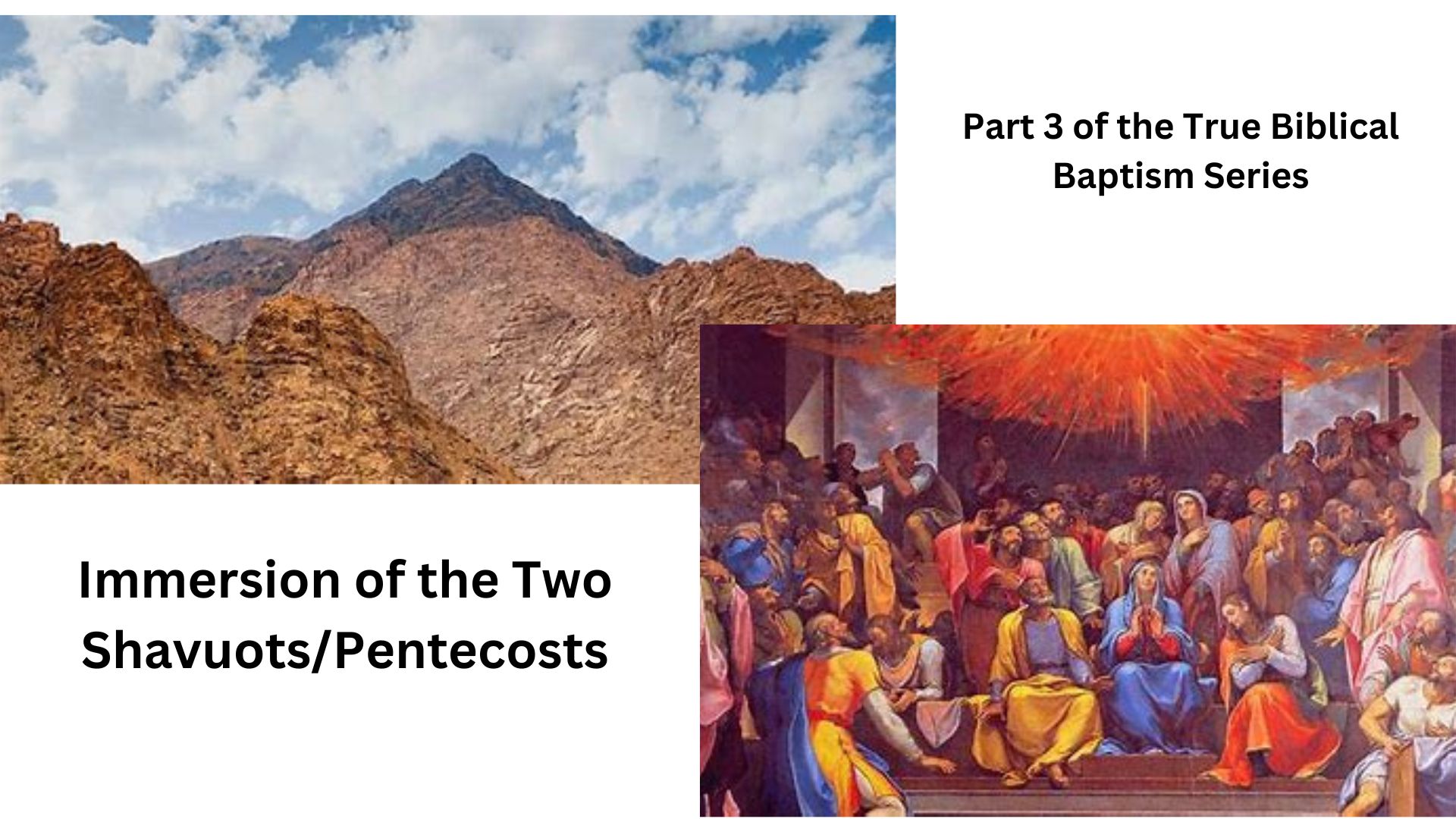There are two things I wish to cover in this installment of TMTO. The first will be an update on this ministry: What's happening and what's ahead. Secondly, I want to share my thoughts and reflections on the terrible, tragic, horrific, heinous events that transpired...
The Immersion of the Two Pentecosts/Shavuots–Part 3 of our True Biblical Baptism Series
As I am recording and posting this installment of TMTO, it is Preparation Day, June 14, 2024. It is the 48th day of the counting of the omer, which means that Shavuot/Pentecost/Feast of Weeks is just two-days away, on Sunday, June 16, 2024. And yes, some members of our Faith community will have already observed Shavuot. And if you are interested in knowing why this situation exists, I encourage you to either listen to or read my most recent post entitled “Shavuot-Feast of Weeks-Timing is Everything.” (I’ll place the link to that post in this post’s transcript for your convenience.)
This is the Immersion of the Two Pentecosts/Shavuots. It is Part 3 of our True Biblical Baptism Series.
Rabbinic tradition asserts that God’s revelation of himself from Mount Sinai took place on Shavuot, otherwise referred to as the day of Pentecost. That historic event with some 1500 years removed from the day that Abba Yah sent down and filled Yeshua’s disciples with the promised Holy Spirit:
4 And while he was with them, he (i.e. Yeshua) commanded them, “Do not depart from Jerusalem, but wait for what was promised by the Father, which you heard about from me. 5 For John baptized with water, but you will be baptized with the Holy Spirit ⌊not many days from now⌋” (Act 1; LEB; cf. Luk 24.49; Joh 14.16, 26; 15.26).
In many ways, both revelations, both Shavuots — Exodus 19 and Acts 2 — parallel or complement each other. C. M. Hegg of Torah Resources sites one example of the parallel or similarity of the two Shavuots in Yah manifesting himself to our ancient Hebrew cousins at Mount Sinai in irresistible fire (Exo 19.16-19) and the giving of the Holy Spirit to Yeshua’s disciples at the Jerusalem Temple, manifesting as “divided tongues as of fire settling upon each of them” (Act 2.3). Another parallel or similarity — prophetic foreshadowing — may be found in the participants of these two events.
In the case of Yah’s revelation at Sinai, the whole of Israel consisting of her 12 ancestral tribes. In the case of the giving of the Holy Spirit on Shavuot at the Temple in Jerusalem, Yeshua’s disciples represented the 12 tribes of Israel.
The parallels continue. The revelation at Sinai would inaugurate a new chapter in Israel’s history. Apart from Yah moving to fulfill his promise to his friend Abraham, to grant to his descendants the land of promise, the Sinai revelation also laid the foundation by which Bene Yisra’el (aka the sons of Israel) would become a Kingdom of priests and a holy nation unto Yehovah (Exo 19.6). She would become the light to the nations. Israel would possess the means by which the nation peoples could enter into a covenant relationship with the Creator of the Universe. The Shavuot – Holy Spirit event of 28 C.E., Jerusalem — would be the “spark” that would cause Bene haYisra’el – Yeshua’s disciples Turned apostles or sent ones — to advance the saving message of the reign of Yehovah over the nations of this world through the person and ministry of the “walking-talking-Torah,” Yeshua HaMashiyach!
In other words, Yahoshua’s disciples turned apostles/sent one would take the Gospel of the Kingdom to the nations, being equipped to do so by the indwelling of Yah’s Holy Spirit.
Another prophetic parallel between the two Shavuots is found in Yehovah revealing Himself and his Way of life to a mixed multitude that was assembled at the base of Mount Sinai. At the Shavuot event in Jerusalem, Yehovah calls unto Himself Jews from the farthest reaches of the Roman Empire and because of this Revelation of Himself, 3,000 international Jews were added to the Body of Messiah on that Shavuot (Act 2.5-11). Both Shavuots receiving similar but dissimilar revelations of Yehovah consisted of individuals who spoke in different tongues or languages. Yet in both events Yah broke through the language barriers such that each soul in attendance could hear and understand the Creator’s Gospel message.
The Shavuot-Holy Spirit event in Jerusalem was a partial, but historic fulfillment, of John’s prophecy and Yeshua’s promise:
“I indeed immerse you in water unto repentance, but He who is coming after Me (i.e. Yeshua) is mightier than I, whose sandals I am not worthy to bear. He shall immerse you in the Set Apart Spirit and fire” (Mat 3.11; The Scriptures ISR).
“But you shall receive power when the Set Apart Spirit has come upon you, and you shall be My witnesses…” (Mar 1.8; The Scriptures ISR).
Luke records that “they [Yeshua’s disciples] were filled with the Holy Spirit and began to speak in other tongues (aka languages) as the Spirit gave them ability to speak out” (Act 2.4; LEB). This was the second Shavuot that is still being played out today.
Here’s a fun fact beloved: The Apostles’ infilling of the Holy Spirit on the second Shavuot, contrary to traditional Christian teaching, did not take place in the legendary or mysterious “Upper Room.”
Indeed, out of obedience to their Master, Yeshua, the disciples had their lodging together in what Luke described as an upper or upstairs room (Act 1.13). Spaces such as first-century Middle Eastern upper rooms or dwellings were used for various domestic purposes such as “sleeping, dining, and entertaining guests” (Logos 10 Ancient Customs).
Luke lists the occupants of this upper room as being Yeshua’s inner-core disciples, minus, of course, Judas Iscariot who took his own life for obvious reasons. At some point within the 10-days between the Master’s ascension to His Father in heaven and the advent of Shavuot or Pentecost there in Jerusalem, the disciples chose one of the 120 or so disciples by the name Matthias, via the casting of lots, to replace Judas (Act 1.26). Strangely, we never read anything more about Matthias in the Apostolic records. Could it have been Father’s will to replace Judas with Paul, despite the inner core eleven disciples’ well-meaning desire to replace Judas as quickly as possible? Maybe Matthias was not Father’s “pick of the litter.” Just throwing that out there. But continuing.
Luke records that the disciples “diligently engaged with one mind in prayer together with the women (yes, Yeshua had female disciples) and Yeshua’s mother Miriam, along with Yeshua’s half-brothers (Act 1.14). However, no group of true Torah-observant, righteous Jewish men of the first century would be caught dead taking up lodging with women who were not their wives, not withstanding the fact that these women were also disciples of Yeshua. Luke reports that Yahoshua’s inner core disciples, His half-brothers, His mother, and female disciples “busily engaged with one mind in prayer” (Act 1.14).
Question. Where did these upwards of 120 disciples engage themselves in prayer? Certainly not this upper room. Size and social decorum would not have facilitated such an ecclesiastical arrangement. It would have to have been somewhere other than this upper room. Right?
Well, we get the answer to this conundrum in Acts 2.1-2. Although it may not seem obvious to the casual reader, the location where the historic Shavuot outpouring of the Holy Spirit took place is spelled out.
(1) And when the Day of Shavuot had come, they were all with one mind in one place. (2) And suddenly there came a sound from heaven, as of a rushing mighty wind, and it (i.e. the Holy Spirit) filled all the house where they were sitting (Act 2; The Scriptures ISR).
There are two direct points of interest that we may draw from these two verses:
- The Day of Shavuout had come. And because it is the second annual pilgrimage feast of Yah’s sacred calendar year, at least the head/male of every Jewish household was required by Torah to keep this day at the place where Yah placed His Name (Exo 23.15; 34.20). And at this time in Israel’s history, that place where Yah placed His Name was the Jerusalem Temple.
- The Spirit came upon every one of Yeshua’s disciples. Both male and female disciple. And let us not forget or overlook the fact that at least 120 disciples would have been included in this group, all obediently keeping Shavuot at the Jerusalem Temple (Act 2.4). The precise location as spelled out by Luke’s record is “the whole house where they (i.e. the disciples) were sitting.”
Now, the Greek term for house is “oikos”. Scripturally, oikos may refer to any domicile or dwelling such as someone’s home, a lodging place such as an inn, or, as in the context of our passage, the Temple. The Temple? How so? Isn’t the Temple the Temple?
Well, at least 11-Tanach or Old Testament passages directly refer to the Temple as “house”, especially as recorded in the LXX (1 Kin 8.11; 1 Chr 22.5; 2 Chr 5.13-14; 7.1-3; Psa 26.8; Isa 6.1; Eze 10.4-19; 43.4-5; 44.4; Hag 2.8-10; Sir 49.12). The Shekinah Glory or Presence of Yehovah dwelt, at one point in Judah’s history, within God’s House or the Temple. Yeshua referred to the Temple as being “ho oikos mou oikos proseuxes,” or “My (Father’s) house shall be a house of prayer” (Mat 21.13; Mar 11.17; Luk 19.46).
Clearly, it was prophetically fitting that the Shekinah Glory of the Almighty that left the Temple during the Prophet Ezekiel’s ministry because Judah refused to behave herself (Eze 19.18), that the same Spirit would return on the historic day of Shavuot and the disciples of the Son of God would be fully immersed in it!
The other thing to take note of as it relates to the disciples being filled with the promised Holy Spirit is that many Jews from throughout the first century Roman Empire who were, out of obedience to Torah, present in Jerusalem for Shavuot/Pentecost, witnessed this miraculous event:
(5) Now in Yerushalayim there were dwelling Yehudim (aka Jews), dedicated men from every nation under the heaven. (6) And when this sound came to be, the crowd came together, and were confused, because everyone heard them speak in his own language (i.e. the 120 disciples speaking as the Spirit gave them utterance). (7) And they were all amazed and marveled, saying to each other, “Look, are not these who speak Galileans? (8) And how do we hear, each one in our own language in which we were born” (Act 2; The Scriptures ISR)?
If this miraculous event was confined to the mystical upper room as so many of us were indoctrinated to believe they were, how were so many of the foreign Jews who were attending Shavuot on that day, witnesses to these sights and sounds?
The only explanation has to be that the male disciples slept or lodged in that rented upper room near Jerusalem proper for the 10-days leading up to Shavuot/Pentecost, and during the day, they met up with the female disciples, Yeshua’s brothers, and the other disciples for prayer and fellowship at and in the “House” or Temple. And when the divinely appointed hour came on the Day of Shavuot, Yah filled Yeshua’s disciples with His precious Holy Spirit as they fellowshiped and prayed in the House or Temple.
The “indwelling” or “infilling” of Yah’s Holy Spirit is a necessary distinction and reality of every true Netsarim or Messianic. Paul wrote:
“But you (Roman Messianics) are not in the flesh, but in the Spirit, if indeed the Spirit of Elohim (aka the Holy Spirit) dwells in you. And if anyone does not have the Spirit of Messiah, this one is not His” (Rom 8.9; The Scriptures ISR).
Paul’s statement to his Roman Messianic readers is corrective in nature. He is telling them that their lives must now, after their conversion to the true Faith, be controlled by the Spirit, whereas in contrast, their unbelieving counterparts out in the world “…live under the domination of Adam’s sinful nature” (NLT Study Bible Commentary; 2008). They were not to succumb to the influence of their flesh or carnal nature. Being of the Spirit is the reality of the redeemed soul being “under the direction of the indwelling Spirit of God” (Romans-NaC Ro; Mounce, Robert; 1995).
This reality of the Spirit of God dwelling within the true Nazarene Israelite or Messianic, is tempered by the reality that the dwelling place of the Creator of the Universe changed from that of the Jerusalem Temple to the bodies of believers:
“Do you not know that you (Corinthian believers) are God’s temple and the Spirit of God dwells in you” (1 Cor 3.16; The Scriptures ISR)?
(19)…your body is the temple of the Holy Spirit Who is in you, whom you have from God/Elohim, and you are not your own. (20) For you were bought with a price, therefore, esteem Elohim (i.e. glorify God) in your body (1 Cor 6; The Scriptures ISR).
Evangelicals have for years thought that the pouring out of the Holy Spirit upon the disciples of Yeshua was unique to the Pentecost story of Acts 2 and the other Apostolic records. But the truth of the matter is that Yah has filled a select number of His set apart people throughout Israel’s history. Just to name a few:
- Bezalel (Exo 31.3-5).
- The 70-elders of the Exodus (Num 11.25).
- Joshua, son of Nun (Deu 34.9).
- The Prophet Elisha (Sirach 48.12).
- The Prophet Micah (Mic 3.8).
- John the Immerser and Elijah (Luk 1.17).
- Elizabeth and Zacharias, John’s parents (Luk 1.41-67.
- And the list goes on.
What becomes apparent when one engages in a study on this voluminous topic of the infilling of the Holy Spirit, is that the infilling aspect goes beyond the simple gift that Yah grants to those that are His. The infilling and indwelling of the Spirit of Yehovah in a true believer equates to more than it being the believers’ primary source of comfort, leading, and guidance throughout their respective faith walks. It is also given to Yehovah’s chosen ones as evident throughout Luke’s historical account and the Tanach/Old Testament, for specific purposes and “to accomplish distinct tasks” (Hegg, C.M.; Acts-Igniting the Abrahamic Promise, p. 30).
In the case of the Pentecost infilling, the purpose for the infilling of Yeshua’s disciples with the Holy Spirit was to make those affected disciples effective and powerful witnesses to that which they’d all lived, experienced, and knew about the Gospel and their Master Yeshua. And the same premise applies as it related to those in the Tanach who were filled with the Spirit or had the Spirit come upon them. These were souls that the Almighty chose to perform a mighty, and in the realm of human limitations, a daunting and superhuman tasks (e.g. making the implements of the Tabernacle or prophesying amid hostile individuals).
And so it was that in the two Shavuots/Pentecosts that are featured in Scripture, the people of God were immersed. Paul described the immersion of the first Shavuot that the fathers were all under the cloud and all went through the sea and all were baptized (immersed) into Moses in the cloud and in the sea (1 Cor 10.1-2; LEB). And once Israel arrived at the Mountain of God, she was immersed in the Word of God and His glorious Kingdom.
The second Shavuot/Pentecost was a fulfillment of prophecy that promised Yah would immerse His chosen ones in the Holy Spirit. The very presence of the Creator of the Universe that once dwelt in the Tabernacle and later on in Solomon’s Temple, would from that day forward dwell within the deepest recesses of the souls of God’s set apart people.
Indeed, with the advent of both Shavuots, the Kingdom of God had intervened into the affairs of humankind. And the Malchut Elohim is the only hope there is for mankind.
Thus, in closing, we celebrate, keep, guard, and honor Shavuot — Pentecost — for its historic significance to Yah’s grand plan of redemption, salvation, and restoration. We keep Shavuot because Yah commanded His people to do so. And in so doing, we remember and embrace Yah’s gifting of His Word and His Set Apart Spirit. And we commit ourselves with renewed vigor to the service of Yehovah and His Kingdom, knowing that we, as His chosen ones, possess His powerful Spirit that will help us achieve and fulfill our purpose in Yeshua Messiah.
And for you who are our steadfast listeners, I want you to be aware that we will be on a two-week-hiatus as I have to attend to my dad out east next week, and we will be away the following week attending the Surge 2024 Women’s conference in Waxahachie, Texas. Abba willing, we will return sometime around the first-week of July.
Until then, beloved, I bid you Chag Shavuot Semeach — have a blessed and meaningful Shavuot. Until next time, take care.
TMTO Ministry Update and My Thoughts and Reflections on Hamas’ Invasion of Israel
Ten Things God Expects us to do for Sukkot-The Feast of Tabernacles 2023
In today's installment, I will be putting out to you what I have elected to call ten things Yehovah says in His Word that every Netsari, disciple of Yeshua Messiah, must do for Sukkot/Tabernacles. Now, some of you will be acutely aware of many of these things...
The Variegated Shadows of Yom Kippur 2023—Or When Payback is a Bear for the Enemies of God and His Set Apart People
Yom Kippur, the Holiest Day of Yah's Calendar Year Yom haKippurim is considered by many in our Faith and orthodox Judaism as the holiest day of Yah's biblical calendar year. On this holiest of days, Yah mandated His chosen ones to "afflict their...
Thoughts and Reflections on Yom Teruah-The Feast of Tabernacles 2023
This is a special TMTO post that I pray will encourage, and maybe inform you, as it relates to the imminent advent of Yom Teruah, or the Day of the Blowing of Trumpets. As you may, or may not know, we are on the very cusp of receiving this Moedim, this...
Upholding the Utter Holiness of God-My Thoughts and Reflections on Torah Reading 100
Greetings and Shabbat Shalom. It is my hope, trust, and prayer that this posting finds you, your families, and your fellowships well and blessed on this warm but blessed Sabbath in the DFW. A Short Passage with a Big Message This 100th parashah of our three-year...
God’s Priestly Armies Then and Now: Thoughts and Reflections on Torah Portion 99
Greetings on this warm Shabbat in Maryland. May this post find you, your families, and your fellowships well and bless. These are my thoughts and reflections on the 99th reading of the 3-year Torah Reading cycle. I've entitled this post "God's Priestly Army Then and...
The Power From Within-Thoughts and Reflections on Parashah 98
Greetings to you on yet another exceptionally warm Sabbath in the DFW. May this day of rest find you, your families, and your fellowships well and blessed. These are my thoughts and reflections on the 98th Torah or Parashah Reading of our 3-year reading cycle. It is...
God Brings His Children Unto Himself: My Thoughts and Reflections of Torah Reading 97
Greetings on this warm summer Shabbat in the DFW. These are my thoughts and reflections on the 97th reading of our three-year Torah Reading Cycle. It is contained within Numbers 1:1-2:13; the Haftarah in Ezekiel 47:13-23; and the Apostolic in Luke 15:1-7....
The Realities of the Messianic’s Liberty in Messiah–Thoughts and Reflections of Torah Reading 95
These are my thoughts and reflections on the 95th parashah of the 3-year Torah Reading cycle. It is contained in Leviticus/Vayiqra 25:39-26:2. I’ve entitled this discussion: The Realities of the Messianic's Liberty in Messiah--Thoughts and Reflections on Torah Reading...
TMTO Ministry Update
Greetings I'm back! Well, not quite. But almost. History of Ministry QFC (2012) Blog (2012) Podcast (2014-11/2022) YouTube (2018-11/2022) QFC Affiliates with Feastkeepers (New York) and First Century COG (Baltimore) (2019-2021) Why we ended the podcast...





